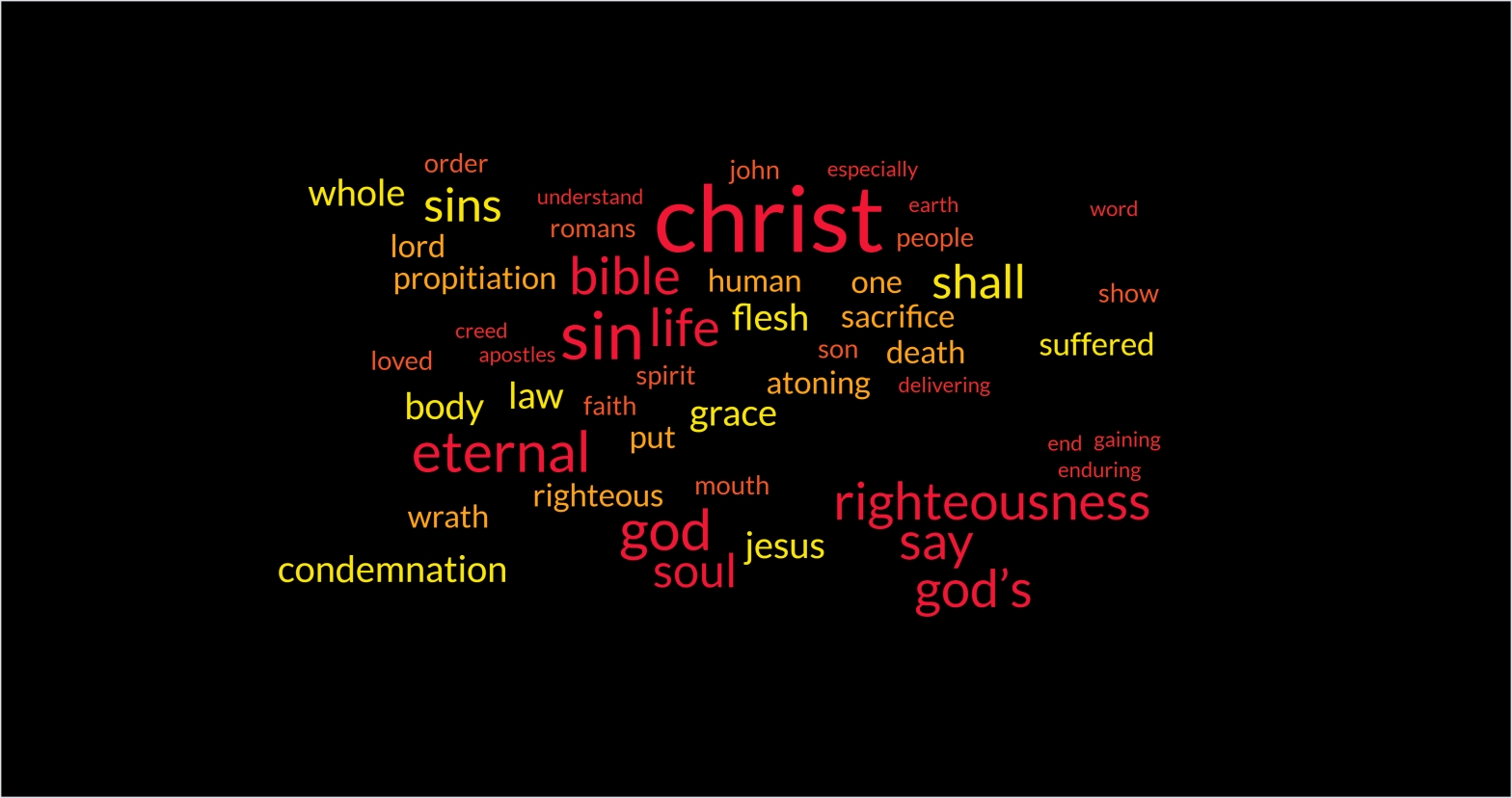- What does the Bible say about Christ enduring God’s wrath against human sin?
- What does the Bible say about Christ being the only atoning sacrifice for our sin?
- What does the Bible say about Christ delivering us from eternal condemnation?
- What does the Bible say about Christ gaining for his people God’s grace, righteousness, and eternal life?
Lord’s Day 15: Q & A 37
Q. What do you understand by the word “suffered” [in the Apostles’ Creed]?
A. That during his whole life on earth, but especially at the end, Christ sustained in body and soul the wrath of God against the sin of the whole human race.
Heidelberg Catechism
This he did in order that, by his suffering as the only atoning sacrifice, he might deliver us, body and soul, from eternal condemnation, and gain for us God’s grace, righteousness, and eternal life.
What does the Bible say about Christ enduring God’s wrath against human sin?
What do you understand by the word “suffered”?
That during his whole life on earth, but especially at the end, Christ sustained in body and soul the wrath of God against the sin of the whole human race.
“Who has believed what he has heard from us?
(Isaiah 53, ESV)
And to whom has the arm of the Lord been revealed?
For he grew up before him like a young plant, and like a root out of dry ground; he had no form or majesty that we should look at him, and no beauty that we should desire him.
He was despised and rejected by men, a man of sorrows and acquainted with grief; and as one from whom men hide their faces he was despised, and we esteemed him not.
Surely he has borne our griefs and carried our sorrows; yet we esteemed him stricken, smitten by God, and afflicted.
But he was pierced for our transgressions; he was crushed for our iniquities; upon him was the chastisement that brought us peace, and with his wounds we are healed.
All we like sheep have gone astray; we have turned—every one—to his own way; and the Lord has laid on him the iniquity of us all.
He was oppressed, and he was afflicted, yet he opened not his mouth; like a lamb that is led to the slaughter, and like a sheep that before its shearers is silent, so he opened not his mouth.
By oppression and judgment he was taken away; and as for his generation, who considered that he was cut off out of the land of the living, stricken for the transgression of my people?
And they made his grave with the wicked and with a rich man in his death, although he had done no violence, and there was no deceit in his mouth.
Yet it was the will of the Lord to crush him; he has put him to grief; when his soul makes an offering for guilt, he shall see his offspring; he shall prolong his days; the will of the Lord shall prosper in his hand.
Out of the anguish of his soul he shall see and be satisfied; by his knowledge shall the righteous one, my servant, make many to be accounted righteous, and he shall bear their iniquities.
Therefore I will divide him a portion with the many, and he shall divide the spoil with the strong, because he poured out his soul to death and was numbered with the transgressors; yet he bore the sin of many, and makes intercession for the transgressors.”
“He himself bore our sins in his body on the tree, that we might die to sin and live to righteousness.
(1 Peter 2:24, ESV)
By his wounds you have been healed.”
“For Christ also suffered once for sins, the righteous for the unrighteous, that he might bring us to God, being put to death in the flesh but made alive in the spirit,”
(1 Peter 3:18, ESV)
What does the Bible say about Christ being the only atoning sacrifice for our sin?
This he did in order that, by his suffering as the only atoning sacrifice,
“[Christ] God put forward as a propitiation by his blood, to be received by faith.
(Romans 3:25, ESV)
This was to show God’s righteousness, because in his divine forbearance he had passed over former sins.”
“For by a single offering he has perfected for all time those who are being sanctified.”
(Hebrews 10:14, ESV)
“He is the propitiation for our sins, and not for ours only but also for the sins of the whole world.”
(1 John 2:2, ESV)
“In this is love, not that we have loved God but that he loved us and sent his Son to be the propitiation for our sins.”
(1 John 4:10, ESV)
What does the Bible say about Christ delivering us from eternal condemnation?
he might deliver us, body and soul, from eternal condemnation,
“There is therefore now no condemnation for those who are in Christ Jesus.
(Romans 8:1–4, ESV)
For the law of the Spirit of life has set you free in Christ Jesus from the law of sin and death.
For God has done what the law, weakened by the flesh, could not do.
By sending his own Son in the likeness of sinful flesh and for sin, he condemned sin in the flesh, in order that the righteous requirement of the law might be fulfilled in us, who walk not according to the flesh but according to the Spirit.”
“Christ redeemed us from the curse of the law by becoming a curse for us—for it is written, “Cursed is everyone who is hanged on a tree”—”
(Galatians 3:13, ESV)
What does the Bible say about Christ gaining for his people God’s grace, righteousness, and eternal life?
and gain for us God’s grace, righteousness, and eternal life.
““For God so loved the world, that he gave his only Son, that whoever believes in him should not perish but have eternal life.”
(John 3:16, ESV)
“[We] are justified by his grace as a gift, through the redemption that is in Christ Jesus, whom God put forward as a propitiation by his blood, to be received by faith.
(Romans 3:24–26, ESV)
This was to show God’s righteousness, because in his divine forbearance he had passed over former sins.
It was to show his righteousness at the present time, so that he might be just and the justifier of the one who has faith in Jesus.”
Discover more from Explaining The Book
Subscribe to get the latest posts to your email.

